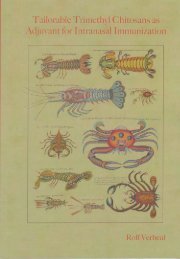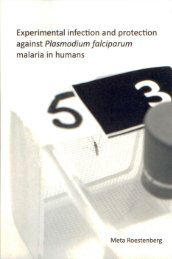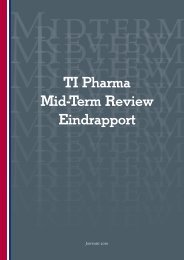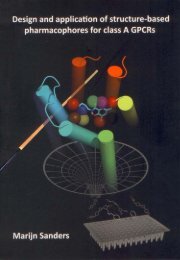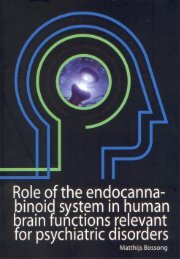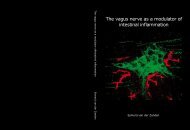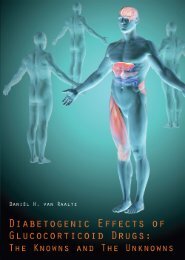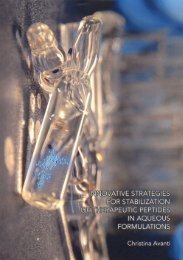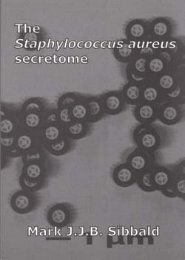Chromosome segregation errors: a double-edged sword - TI Pharma
Chromosome segregation errors: a double-edged sword - TI Pharma
Chromosome segregation errors: a double-edged sword - TI Pharma
Create successful ePaper yourself
Turn your PDF publications into a flip-book with our unique Google optimized e-Paper software.
will inevitably lead to severe aneuploidy, which strongly compromises tumor cell viability 527 .<br />
Presumably the enhanced chromosomal instability kills tumor cells because the genetic imbalance that<br />
is produced as a result of error prone chromosome <strong>segregation</strong> is too severe to produce a viable daughter<br />
cell. Obviously, <strong>segregation</strong> <strong>errors</strong> that result in loss of one or more chromosomes that contain essential<br />
genes will not produce two viable daughter cells 534 . In fact, aneuploidy is in most cases incompatible<br />
with embryonic viability 535 . On the other hand, aneuploid tumor cells can proliferate without difficulty,<br />
so the coupling between aneuploidy and cell viability is not so that aneuploidy is never tolerated.<br />
How exactly does aneuploidy compromise cell viability? Recent work in yeast has shown that<br />
introduction of as much as a single extra chromosome leads to an extra burden on the cells’ transcription<br />
machinery, since most genes on the extra chromosome are being transcribed 446 . Together with the<br />
increase in transcriptional activity, increased protein synthesis and proteasomal degradation produce<br />
a higher demand on the cellular metabolism and results in increased energy consumption 445,446 .<br />
The presence of extra chromosomes can trigger the activation of stress pathways, owing to<br />
protein imbalances, proteotoxic stress and presumably higher levels of Reactive Oxygen Species<br />
(ROS) 407,431,445,446 . Due to activation of these stress pathways, aneuploidy will lead to a decrease in<br />
the speed of cell growth and enhanced lethality in an otherwise healthy population of cells 445,446 .<br />
In line with this, it has been hypothesized that another specific strategy to kill aneuploid tumor<br />
cells could be to enhance proteotic stress, for example by inhibiting the proteasome machinery 446 .<br />
The actual molecular pathways underlying the initial cell cycle delay following single chromosome<br />
mis<strong>segregation</strong>s and aneuploidy are starting to emerge. <strong>Chromosome</strong> mis<strong>segregation</strong> events<br />
have been shown to inhibit cell cycle progression through activation of p38 and eventually p53<br />
431 . Interestingly, inhibition of p38 function selectively targets aneuploid or tetraploid cells 536 .<br />
Moreover, recent data suggest that ATM also plays a role in the observed p53 activation following<br />
acquisition of an aneuploid state 407 . Presumably, due to the increase in oxidative stress ATM can get<br />
directly activated in the aneuploid cell 537 and in turn can activate p53 407 . Whether other upstream<br />
pathways could contribute to the observed p53 activation is still unknown. Thus, it would seem that<br />
chromosome <strong>segregation</strong> <strong>errors</strong> and gene imbalances result in the activation of a variety of stress<br />
pathways that restrict the proliferative capacity of the newly formed aneuploid cells. The fact that<br />
aneuploid tumor cells can readily proliferate indicates that cells can adapt to this acute stress response<br />
538 . Clearly the success of a strategy that enhances chromosome imbalances in the tumor will heavily<br />
depend on the ease at which the aneuploid cell can adapt to the newly acquired genetic imbalance it<br />
is confronted with.<br />
4.4 Specificity of exploiting CIN<br />
The question remains how the tumor specificity of the diverse strategies to exploit CIN can be<br />
maximized and how adverse effects on healthy dividing tissue can be minimized. Normal cells have<br />
a defined diploid content of chromosomes, while tumor cells mostly contain a much larger number<br />
of chromosomes. As a consequence, the time required for healthy cells to correctly align their<br />
chromosomes in mitosis is much shorter when compared to aneuploid tumor cells that typically<br />
harbor many extra chromosomes 539 . Thus, decreasing the duration of mitosis by mitotic checkpoint<br />
inhibition is likely to have more disastrous effects on aneuploid tumor cells than normal diploid cells.<br />
In fact, mitotic checkpoint inhibition in healthy cells does not necessarily cause <strong>segregation</strong> <strong>errors</strong><br />
299,540 (Fig.3). Moreover, since CIN cells already start off with massive genome imbalances, they may<br />
perhaps be more sensitive to chromosome mis<strong>segregation</strong> events when compared to healthy cells 290 .<br />
More research is needed to determine whether CIN cells will reach the critical threshold of <strong>segregation</strong><br />
<strong>errors</strong> more easily than healthy cells following disturbance of chromosome <strong>segregation</strong>.<br />
83<br />
Mitosis as an anti-cancer target<br />
4



